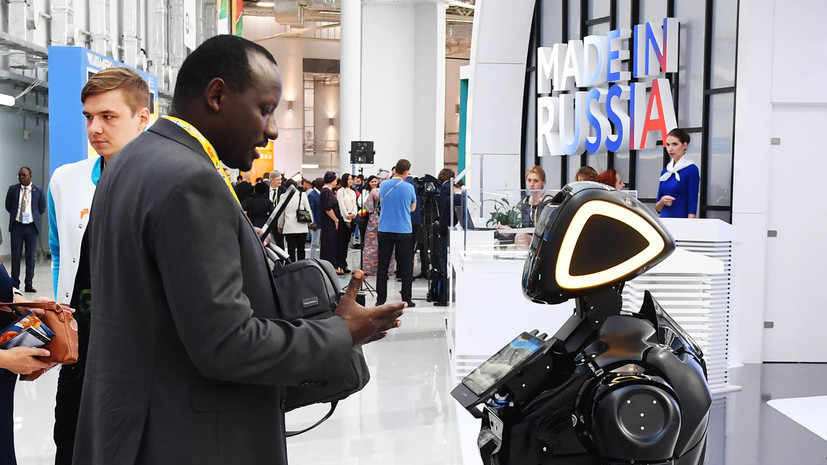In Soviet times, Russia actively helped African countries, but this assistance was based on ideology. In the 90s, Russia, according to forum participants, “got up and left” from the continent. And only now the state is ready to again cooperate with the region, and on mutually beneficial market conditions. And this is understandable - according to experts, by 2050 the total GDP of African countries will reach $ 29 trillion. In this vein, the participants of the two-day Russia-Africa Forum discussed new opportunities in financial and economic cooperation with Africa.
VTB Head Andrei Kostin emphasized that some African countries are under sanction pressure, but fintech is very developed in the region. For example, the Kenyan quick payment system is considered almost the best in the world. The top manager of the state bank also emphasized the need to expand the practice of non-dollar settlements. Sergey Glazyev, Minister for Integration and Macroeconomics of the Eurasian Economic Commission, also spoke about the joint construction of his own monetary and financial infrastructure.
However, Russia has already achieved success in working with the continent. President Vladimir Putin emphasized that over five years the commodity circulation of our country and African countries has doubled and exceeded $ 20 billion. Russia is one of the ten countries supplying food to the region. Thus, the volume of agricultural supplies (more than $ 25 billion) exceeds the volume of arms supplies ($ 15 billion).
The main statement by the head of state was information about Russia's write-off of debt to certain African countries in the amount of $ 20 billion.
$ 4 Trillion Resources
Now Russia’s largest project in Africa is the construction of a nuclear power plant in Egypt, which, according to the calculations of Rosatom specialists, will create 13 thousand new jobs and can increase the GDP of the Arab Republic by tens of millions of dollars.
However, Russia works with the states of the continent and in the humanitarian direction. The head of Rossotrudnichestvo, Eleanor Mitrofanova, said that humanitarian aid to Africa now amounts to about $ 1 billion.
But even this is not enough, some forum participants say. So, the chairman of the supervisory board of the International Agency for Sovereign Development Konstantin Malofeev presented the report “Conspiracy against Africa: breaking the chains of colonialism”. He said that Africa’s unused resources are estimated at $ 4 trillion. At the same time, Malofeev considers Africa's sovereign debt to be one of the attractive assets for investors. The Director General of the African Finance Corporation, whose investment portfolio is estimated at $ 6 billion, Samaila Zubairou, who confirmed that Africa is ready to work with risky projects, as the states of the continent have low interest on default, agrees with him.
In a conversation with RT, Director of the Institute of Asian and African Countries of the Russian Academy of Sciences Irina Abramova explained that when investors form their portfolio, it should be diverse. “There is one general rule: the higher the risk, the higher the significance and return on investment. It is already the investor’s task to understand investments, including in risky securities, ”Abramova emphasized.
In turn, Malofeev also believes that infrastructure facilities should be a priority for investors. For example, only 44% of the inhabitants of the continent have access to electricity. In sub-Saharan Africa, except South Africa, railroad density is 27 times lower than in India and 50 times lower than in China.
But the problem is not only the lack of railways, but also the high cost of transportation. For example, the founder of Africa Development Solutions Samba Batili said that the cost of transporting goods from the capital of Senegal, Dakar to the capital of Mali Bamako (about 1,400 kilometers) is $ 3 thousand, while in France you need to pay $ 600 for such a distance.
One of the main problems in building a successful African economy rests on high interest rates - in Uganda it is 27% - and corruption, Batili said.
However, the head of the Ministry of Economic Development Maxim Oreshkin in an interview with RT was optimistic about the prospects for cooperation with Africa.
“Russia today has the competencies that Africa needs. We are talking about such areas as the development of human capital, healthcare, education, digital technologies, infrastructure and energy. Thus, we have what is interesting for African countries, ”said Oreshkin.
As the Minister emphasized, in joint projects with African countries, Moscow is trying to achieve mutual benefits for all parties to the partnership. According to Oreshkin, such a business approach distinguishes Russia from other competitors in the market.
“The important thing is how we build relationships with African partners. We do not impose our services and do not try to vparit something. We are working to implement joint projects that will contribute to the development and improvement of the quality of life in Africa, ”concluded Maxim Oreshkin.

